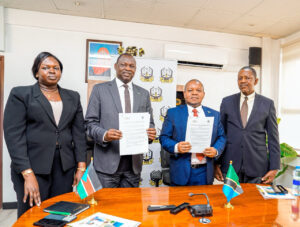By Debiprasad Sarangi
Tanzania’s hospitality sector is undergoing a remarkable transformation, fueled by a boom in tourism. By April of this year, the country had already surpassed its 2025 tourism target, attracting 5.3 million international visitors, which signals a promising trajectory for the travel industry.
This article delves into how Tanzania’s hotel sector is primed for significant expansion alongside rising tourism, highlighting the crucial role of cloud-based solutions in driving this growth.
Additionally, we will explore why platforms like Hotelogix are at the forefront of this transformation.
Tourism: The growth engine
In 2023, the sector contributed TSh18.6 trillion to the economy, surpassing pre-COVID peaks. The World Travel & Tourism Council (WTTC) predicts this will climb further and reach TSh30.9 trillion by 2034.
Europe remains the largest source of visitors, followed by Asia, the Americas, and Africa.
The government’s focus on high-income, eco-conscious tourists ensures sustainable growth, with initiatives promoting eco-tourism and cultural preservation.
By 2030, Tanzania aims to host about 3 million visitors annually, necessitating a significant increase in hotel capacity.

Tanzania’s hotel industry: A snapshot
As of 2021, the country had approximately 8,700 available hotel rooms.
The number of hotels under development is also rising, with 3,432 rooms in the pipeline as of early 2025, part of Africa’s broader 13.3% increase in hotel construction.
Forecasts suggest the hotel market will grow at a 5.10% CAGR from 2024 to 2029, reaching a market volume of US$445 million (about TSh1.19 trillion) by 2029.
By 2030, according to experts, the sector will add thousands more rooms to accommodate growing demand, particularly in key regions like Dar es Salaam, Arusha, and Zanzibar.
Diversity in hotel types
The spectrum is broad, from eco-lodges nestled in natural reserves to city hotels in bustling urban centers.
Boutique hotels are gaining popularity, appealing to travelers seeking personalized experiences.
Moreover, with increased luxury travel, new high-end developments are on the horizon, promising to enhance Tanzania’s appeal to affluent tourists.
Adoption of technology: The era of cloud
Initially, hotels in Tanzania hesitated to embrace new technologies, primarily because of the high investment costs.
However, this has changed as cloud-based solutions have become more accessible.
Plus, the industry’s attempt to recover quickly from losses during the COVID period has also promoted rapid technology adoption among hotels of all types.
Additionally, government regulations and compliance requirements necessitate that hotels use the appropriate technology platform.
Hotelogix: Leading the cloud migration
Hotelogix has emerged as a key partner for Tanzanian hotels transitioning to the cloud.
While our multi-property management system allows growing groups to centrally manage operations across all properties from their head office with just one sign-on, our all-in-one functionalities help standalone and small/mid-scale properties to streamline their daily processes, improve efficiency, and enhance the overall guest experience.
Our 24/7 multi-channel support and training have made us a preferred technology partner for properties eager to modernize and scale.
Additionally, implementing e-invoicing for Tanzanian hotels through a Virtual Fiscal Device (VFD) vendor exemplifies our commitment to enhancing operational efficiency while complying with Tanzania Revenue Authority (TRA) guidelines.
Here is what Niels van Capel, Financial Controller at Paradise & Wilderness Group, has to say about Hotelogix: “Hotelogix has offered us the much-needed centralised control over everything – from managing rates across properties, accessing several group-wide reports to gain insights into our performance and knowing guest preferences via central guest history. They have impressed us with faster implementation, seamless integration, and support via a dedicated account manager.”
Paradise & Wilderness Group manages 25 properties, including lodges close to famous national parks, resorts, and boutique hotels in and around beautiful beaches.
Hotels in Tanzania require a modern technological framework to drive growth and enhance guest experiences. To accelerate this process, Hotelogix provides a cloud-based, flexible infrastructure with robust tools and features to streamline operations and improve service delivery.
Transform Hotel Management with Hotelogix:
Trusted Globally, readily available in Tanzania
Hotelogix is a cloud-based Property Management System (PMS) designed to streamline hotel operations, enhance guest experiences, and boost revenue. Trusted by hoteliers in over 100 countries, it offers a comprehensive suite of tools suitable for independent hotels, boutique properties, and small hotel chains.
Key Features
- Reservation & Front Desk Management:
- Simplify check-ins and check-outs with a user-friendly drag-and-drop calendar.Hotelogi
- Channel Manager:
- Synchronize room availability and rates across multiple OTAs in real-time to prevent overbookings.Hotelogix+3Hotelogix+3Hotelogix+3
- Mobile Access:
- Manage operations remotely via mobile devices, ensuring flexibility for staff.
- Point of Sale (POS):
- Integrate charges from various hotel services directly into guest bills.
- Housekeeping Management:
- Monitor room status in real-time, enhancing operational efficiency.Hotelogix+2Hotelogix+2Hotelogix+2
- Reporting & Analytics:
- Access centralized data for informed decision-making and performance tracking.
- Guest Services App:
- Allow guests to place orders, make requests, and communicate via their smartphones.Hotelogix+2Hotelogix+2Hotelogix+2
- Revenue Management:
- Utilize occupancy-based dynamic pricing to optimize room rates.Hotelogix
- Integration Capabilities:
- Connect seamlessly with over 100 third-party solutions, including CRM systems, payment gateways, and accounting tools. Hotelogix+2Hotelogix+2Hotelogix+2
Availability in Tanzania
Hotelogix is accessible globally, including in Tanzania. Its cloud-based nature ensures that hotel staff in Dar es Salaam can manage operations remotely, providing flexibility and efficiency.








